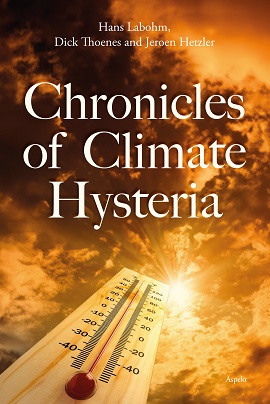
Onder de titel, ‘This Green Make-Believe Is Devastating Our Environment And Our Budgets’, schreef Christopher Booker in ‘The Sunday Telegraph’:
It is time we woke up to the fact that all this ‘green’ energy nonsense represents one of the most bizarre collective flights from reality in history. But so long as the Climate Change Act is in force, we remain firmly in its grip.
The oddest thing about the political crisis gripping Northern Ireland was what triggered it. In 2012, under an EU ruling that burning wood was “carbon neutral”, the Northern Irish government, led by Arlene Foster and Martin McGuinness, adopted a “green” scheme introduced by the UK the previous year, the Renewable Heat Incentive (RHI), offering lavish subsidies to businesses to use wood chips to heat their premises.
RHI was launched in Belfast without any control over how the money was spent. When businesses discovered that they could be paid £160 for every £100 they spent on wood, so many signed up, even using it to heat empty buildings, that, by 2020, it was estimated, the bill to UK taxpayers could have risen to £1 billion.
But this is only one of the countless unforeseen consequences of that obsession which has long held our politicians in its grip: the belief that, to “save the planet”, we must replace the fossil fuels on which our entire way of life rests with new sources of supposedly “carbon-free” renewable energy. …
Vervolgens schenkt hij aandacht aan een aantal absurde aberraties van het Britse klimaat cum energiebeleid.
1. The “Renewable Heat” Fiasco
Northern Ireland is only the most publicised instance of the absurdities created by the Renewable Heat Incentive. When in 2014 the Government extended this scheme to domestic premises, many owners of large houses across Britain realised that the more they kept their boilers running, even in summer, the more profit from the taxpayer-funded subsidy they could make. Since 2013 our bill for all this has been soaring so fast that, within four years, according to the Office for Budget Responsibility, it will have totalled nearly £5 billion. …
2. The “Biomass” Farce
On a much grander scale is the sad story of Drax in Yorkshire: until recently the largest, cleanest and most modern coal-fired power station in Europe, supplying 8 per cent of Britain’s electricity. When in 2010 fossil-fuel power stations began to be squeezed by George Osborne’s “carbon tax”, intended to make them increasingly uneconomical, Drax decided to spend £700 million on converting its giant boilers to “biomass”, burning wood. For the three already converted, instead of being “carbon-taxed”, Drax now receives a whopping subsidy under the “renewable obligation” worth nearly £500 million a year.
But what has made this really shocking is that most of the 7.5 million tons of wood Drax uses each year is being shipped from the south-eastern states of America, where 4,600 square miles of forest are annually being felled, to be turned into wood pellets for burning 4,000 miles away in Yorkshire. …
In een KNAW rapport van januari 2015 over biomassa werd geconcludeerd: Het verbranden van hout in elektriciteitscentrales en van bio- ethanol en biodiesel in auto’s lijkt niet of nauwelijks bij te dragen aan besparing van CO2-uitstoot. Daarom zijn ze niet geschikt als middel voor de transitie naar een duurzame energievoorziening.
Na eerst te hebben gepleit voor de inzet daarvan is dit inmiddels ook de positie van de milieubeweging. Waarom stopt men dan niet het zwaar gesubsidieerde bijstoken van biomassa in elektriciteitscentrales? Dan haalt men de vastgestelde doelstellingen van de vermindering van CO2-uitstoot niet. Maar als de KNAW stelt dat de verbranding van biomassa niet of nauwelijks bijdraagt aan de besparing van CO2-uitstoot? Er dient een onderscheid te worden gemaakt tussen de werkelijke uitstoot en de uitstoot die wordt berekend op basis van de criteria die beleidsmatig zijn vastgelegd. Het spreekt toch vanzelf dat die laatste prevaleren. Toch!?
Conclusie: het blijkt de beleidsmakers kennelijk niet om het klimaat te gaan, maar om het halen van boekhoudkundige doelstellingen, waarvan de KNAW – zij het in wat nettere bewoordingen – stelt dat ze onzinnig zijn.
3. The “waste into gas” threat
More controversy has lately been spiralling around another subsidy bonanza, again under the RHI and costing taxpayers £216 million a year. Developers have rushed to build nearly 100 giant “anaerobic digesters”: massive industrial plants in the countryside, designed to supply methane to the national gas grid made from food waste and crops such as maize, now specially grown on hundreds of thousands of acres formerly producing food to eat.
A particular concern for those living near these unsightly operations is not just their smell and the thousands of vehicle movements needed to bring in their fuel, but the growing list of pollution incidents from leaks of toxic ammonia, killing farm animals and wildlife. …
4. Tidal fantasies
Many have long dreamed of harnessing the energy of the sea to produce electricity. Recently yet another such project collapsed, with a giant wave-powered turbine on the Welsh sea-bed, costing £18 million (£8 million of it from the EU), having broken down after just three months of operation.
Far more ambitious is the proposal to invest £40 billion in the world’s first huge “tidal lagoons”, first in Swansea Bay, with five others to follow. But, as I wrote two weeks ago, the derisory amount of power these might produce, paid for by mind-boggling subsidies, should make this a pipe-dream.
5. When the wind doesn’t blow
Of the £52 billion Britain has invested in “renewables” since 2010, by far the largest chunk has gone into wind and solar farms, which, for a subsidy of more than £5 billion a year, now produce 14 per cent of the UK’s electricity, But the penny has now widely dropped that when the wind doesn’t blow and the sun doesn’t shine, these are not only useless, but require immediate and very expensive back-up from gas-fired power stations (and even thousands of diesel generators), to keep our lights on. …
Aldus Christopher Booker.
Lees verder hier.
Ook in het VK is het energiebeleid nog steeds in de greep van de irrationele angst voor opwarming van de aarde (eigenlijk atmosfeer). De rationaliteit moet daarvoor nog steeds wijken.
Voor mijn eerdere bijdragen over klimaat en aanverwante zaken zie hier, hier, hier, hier en hier.






Het “redden van de planeet” is een dermate verheven doel dat onderbouwing (technisch, financieel) overbodig wordt geacht. De subsidies trekken bovendien opportunisten aan. Het gaat nu allang niet meer om het klimaat of de natuur, maar uitsluitend om de handel. Om met de inferieure “groene” energie nog wat te kunnen doen is zeer veel apparatuur nodig. Allen dank zij zware ideologische verblinding kan je die afzetten. Zie ook een cult-automobiel als de Tesla (35000 euro aan accus en halve actieradius van een benzinewagentje)
Voor groenbevlogenen toch best een onverdachte instantie:
Wood Smoke and Your Health
https://www.epa.gov/burnwise/wood-smoke-and-your-health